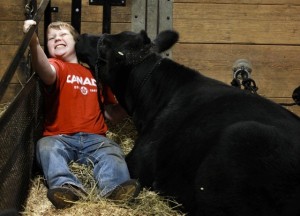The strain of E. coli O157:H7 that caused an outbreak among people at the Milk Makers Fest in April has been found in the north end of the dairy barn where the event was held, according to a report released Wednesday, June 3.
 “The bottom line here is we can’t expect an environment like a barn to ever be completely free of pathogenic bacteria,” said Tom Kunesh, environmental health supervisor for the Whatcom County Health Department.
“The bottom line here is we can’t expect an environment like a barn to ever be completely free of pathogenic bacteria,” said Tom Kunesh, environmental health supervisor for the Whatcom County Health Department.
So why take little kids into that environment, as schools routinely do?
About 1,325 Whatcom County first-grade students, plus the teachers and parents who accompanied them, from all school districts in Whatcom County went to the annual event April 21-23 at the Northwest Washington Fairgrounds in Lynden.
Disease investigators calculated case counts based only on lab-confirmed infection with E. coli O157:H7 or physician-diagnosed hemolytic uremic syndrome (HUS), a type of kidney failure.
- 25 people were confirmed cases.
o 9 of these cases were considered secondary cases (the ill person didn’t attend the event but had close contact with someone who did attend).
- No one died.
- 10 people were hospitalized.
- 6 people developed HUS.
Multiple samples from the environment where the event was held were collected on two different days (April 30 and May 13) and submitted for laboratory testing. The samples indicated that several areas of the north end of the Dairy Barn at the Northwest Washington Fairgrounds were contaminated with the same strain of E. coli that made people ill. Negative results do not rule out contamination in other parts of the barn.
The outbreak strain of E. coli O157:H7 was identified in the following areas of the Dairy Barn:
- Manure bunker
- Hay maze area
- Bleachers by east wall
- Bleachers by west wall
Any environment where animals have been kept, such as barns, should be considered contaminated. E.coli O157 can survive in the environment up to 42 weeks (Varma, 2003 JAMA).
As part of the investigation, officials interviewed many of the confirmed cases to find out what they did during the event before they got ill. Officials also interviewed “controls,” meaning people who attended the Milk Makers Fest but did not get ill to find out what they might have done differently.
The results of analyzing the data collected during the interviews are not final, but a few preliminary findings stand out:
- Event attendees who reported washing or sanitizing their hands before eating lunch were less likely to become ill.
- Children who reported always biting their nails were more likely to become ill.
- Leaving animal areas without washing hands might have contributed to an increased risk of transmission.
- Eating in animal areas might have contributed to an increased risk of transmission.
Recommendations for Event Organizers:
- Evaluate and update plans for cleaning and disinfection before, during, and after events, particularly surfaces with high levels of hand contact (such as seats, door or fence handles, and hand railings).
- Evaluate and update measures to restrict access to areas more likely to be contaminated with animal manure.
o This is especially important for people at higher risk for severe illness. These people include young children, pregnant women, adults older than 65, and people with weakened immune systems.
- Ensure access to hand washing facilities with soap, running water, and disposable towels.
- Display signs and use other reminders to attendees to wash hands when leaving animal areas.
- Store, prepare, or serve food and beverages only in non-animal areas.
